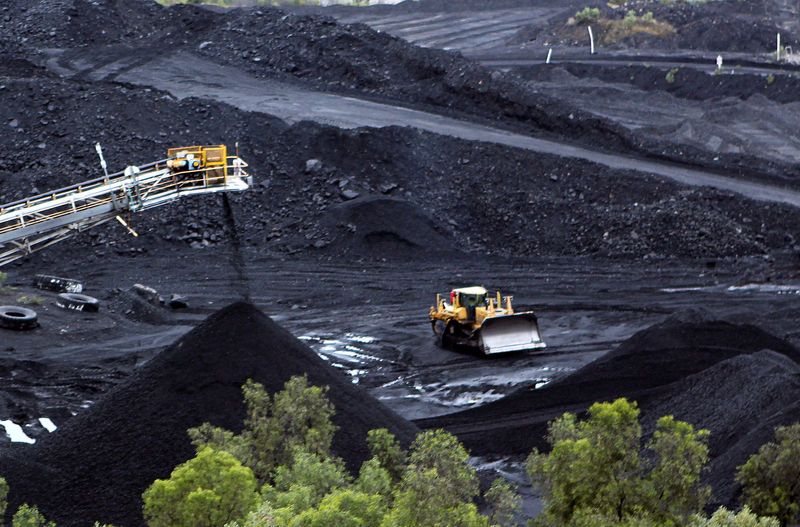By Chen Aizhu
SINGAPORE (Reuters) - What to do with China's abundant stock of coal? Chemical giant Hengli plans to make clothes out of it.
It may sound like something from ancient alchemy, but the privately-owned Chinese company surprised industry watchers in
June when it said it was getting into mining with a $20 billion project to convert coal into polyester yarn, used in clothes, packaging and plastic bottles.
The announcement was intriguing. Coal is not a typical raw material for polyester and Hengli's plan will be the world's first of its kind in the China-dominated coal to chemical sector, where investment so far has totalled $85 billion according to the China Petroleum and Chemical Industry Federation.
It also comes after Hengli borrowed heavily to set itself up as an oil refiner, using crude to make polyester.
The shift into coal, a major source of smog and climate-warming greenhouse gases, is at odds with a global push to reduce reliance on fossil fuels and will exact a heavy environmental price, according to industry analysts.
But the project, which Hengli aims to have running by the end of 2025 in Shaanxi province, fits into Beijing’s enduring commitment to coal and will add Hengli to a roster of Chinese companies, including coal miner Shenhua Group and oil refiner Sinopec, which have moved into the coal to chemicals business.
(GRAPHIC - China's capacities turning coal into olefin: https://fingfx.thomsonreuters.com/gfx/ce/azgpokklxpd/CTOcapacity.png)
"By picking Hengli, the country's largest polyester producer with extensive reaches to the consumer textile market, it will help Shaanxi province efficiently develop its rich coal resource and grow the local economy," said Zhu Fang, senior researcher at the China Petroleum and Chemical Industry Federation, which represents over 400 oil and chemical firms.
Hengli, as a Chinese company and one of the world’s largest polyester yarn producers, also stands a better chance of getting regulatory approvals for its plan, according to analysts.
Officials from Yulin city, in Shaanxi province where Hengli plans to base its coal-to-polyester operations, approached the company first with the idea of setting up a plant there, according to company spokesman Li Feng, and it took about 10 months for Hengli and the city to reach a deal.
An official inter-provincial alliance between economically lagging Shaanxi and coastal Jiangsu, China's second wealthiest province, where Hengli is headquartered, may also help it gain regulatory support, as the project will generate jobs and boost local revenue, according to a Beijing-based executive from a rival company.
Li, Hengli’s spokesman, declined to comment on the likelihood of regulatory approvals and said the project was about diversification from oil, full integration and economies of scale not politics.
"With technological advances in the large-scale coal-to chemical plants, the cost of building and operating such a facility will become more and more competitive," he said.
Global rivals Dow Chemicals (N:DOW), Saudi Basic Industries (SABIC) (SE:2010) and Total (PA:TOTF) faced lengthy regulatory processes when they planned similar ventures in China. Dow and Total ultimately abandoned their plans amid a range of challenges from financial and environmental cost to the competition from cheaper shale gas-based projects in the United States.
SABIC, one of the world's largest petrochemicals groups, said the company has yet to make any further announcement after signing a preliminary deal with Shenhua Ningxia Coal Industry Group in 2016 to build a coal-to-olefin complex.
ENVIRONMENTAL IMPACT
Established in 1994 as a small weaving factory, Hengli has transformed into one of the world’s largest polyester yarn producers, feeding off China's demand as the world's largest consumer of textile.
Hengli had annual revenues of $80 billion last year, according to the company. It founders, group chairman Chen Jianhua and his wife Fan Hongwei, who heads its listed unit Hengli Petrochemical (SS:600346), were ranked 16th in Forbes magazine’s annual China rich list.
The company took on 70% debt to fund its 56.4 billion yuan refinery complex leaving it with an eye-watering debt to asset ratio of 78% compared to Sinopec's 50%, according to company figures.
Hengli will finance 30% of the Yulin investment from its own funds and the rest from Chinese banks, said Li.
Hengli’s plans involve converting 20 million tonnes of coal into 9 million tonnes of fine chemicals and polyester a year and the company told Reuters it has tapped China Tianchen Engineering Corp and Sinopec's Luoyang Engineering to conduct pre-feasibility studies.
Tianchen did not respond to a request for comment. A Luoyang Engineering representative said the company was at an early stage of cooperation with Hengli and declined further comment.
(GRAPHIC - China's coal and methanol based production of ethylene: https://fingfx.thomsonreuters.com/gfx/ce/jbyvrkkngpe/CTOoutput.png)
While turning coal into industrial chemicals has been widely applied in China, producing aromatics - feedstocks for polyester -- is a relatively novel process which is not commercialized yet.
"(Hengli) is likely to be the first time on such a scale," said Salmon Lee, principal analyst with Wood Mackenzie.
Coal-based chemical plants typically emit three times more carbon dioxide and waste water for each unit of production, compared to oil-based chemical plants, and require oil at $45-$50 a barrel to break even, said industry experts.
The scale of the Yulin project also means it could consume 60 million tonnes of fresh water every year, said a second Beijing based industry executive. That will be roughly enough to supply the whole of Singapore of six million people for five weeks, according to Reuters calculations based on Singapore's official water usage data.
Hengli's Li said the plant's emissions and water use will depend on the final design of the plant.
"So far, we do not foresee any hurdles in winning the emission quotas and water resource(from local government)," he said, adding the company will invest in waste water treatment to maximise the amount of water they can recycle.
Yulin officials did not respond to request for comment about the environmental impact.
